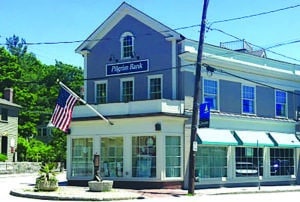The year 2018 was filled with mergers and acquisitions between publicly traded banks, mutual banks and credit unions. In total, there were 16 mergers and acquisitions announced this year, as the banking industry in Massachusetts continued to consolidate.
Rockland Trust Acquires Blue Hills Bank
In the biggest deal of the year, the parent company of Rockland Trust announced in September that it would acquire the parent company of Hyde Park-based Blue Hills Bank for nearly $730 million, representing 178 percent of Blue Hills Bancorp’s current tangible book value. The deal not only took a $2.7 billion bank off the market, it also helped beef up Rockland Trust’s presence in Boston with the addition of branches in Back Bay, the Seaport and Dorchester. Rockland also landed the naming rights to the Blue Hills Bank Pavilion concert venue. The deal catapulted Rockland Trust to more than $11 billion in assets, bringing it within reach of competitors Eastern Bank and Berkshire Bank. Additionally, the deal gave Rockland Trust the largest deposit share and branch network in the state.
People’s United Acquires Belmont Savings Bank
On the heels of the Blue Hills deal, People’s United snapped up the nearly $3 billion Belmont Savings Bank and its six branches in Greater Boston, adding significantly to its presence in the area. It had been rumored for years that Belmont Savings would eventually be purchased; it was only a matter of when. The deal is valued at $327 million, or 160 percent tangible book value. Questions were raised about the pricing, as People’s United paid more for the similarly sized Farmington Bank in Connecticut, and Rockland Trust paid much more for the smaller Blue Hills Bank. However, analysts noted that pricing can vary based on cost savings and a variety of other factors.
Berkshire Bank Acquires Savings Institute and Trust Co.
The parent company of Berkshire Bank this month announced that it would purchase the parent company of Willimantic, Connecticut-based Savings Institute Bank & Trust in an all-stock transaction valued at $180 million. The deal helps the bank fill in its regional footprint by giving Berkshire 18 branches in Eastern Connecticut and its first retail presence in Rhode Island with five branches in the Ocean State. Berkshire got Savings Institute at a good value, 118 percent tangible book value, which is far below other recent deals. However, some analysts saw the acquisition as a strange move for a company that recently moved its headquarters from Pittsfield to Boston, and said it was going to focus on the Boston market.

Bram Berkowitz
Cambridge Trust Acquires Optima Bank & Trust Co.
The parent company of Cambridge Trust announced this month that it would purchase the parent company of Portsmouth, New Hampshire-based Optima Bank & Trust Co. in a part-stock, part-cash transaction valued at about $67 million, or 191 percent tangible book value. Cambridge Trust has been working to build out its premiere banking services and the bank has three wealth management offices in New Hampshire. With the addition of Optima’s six retail branches in the Granite State, Cambridge Trust now has a new platform to which it can cross-sell its private banking and wealth management services.
HarborOne Bank Acquires Coastway Bank
The parent company of Brockton-based HarborOne Bank in March announced that it would purchase the parent company of Warwick, Rhode Island-based Coastway Bank in an all-cash transaction valued at $125.6 million. The deal gave HarborOne an additional $741 million in assets, as of the end of 2017, and nine branches in the Greater Providence area, as well as three mortgage lending offices. The deal also made it more likely that the company will eventually convert to a fully-owned stock company, according to analysts, because the all-cash deal depleted most of HarborOne’s excess capital. HarborOne, which was a credit union just five years ago, issued a partial IPO in 2016.
People’s United Acquires Farmington Bank
While this deal was technically between two Connecticut-headquartered institutions, People’s United has a large presence in Boston and Farmington Bank also has branches in Western Massachusetts. People’s United Bank announced in June that its parent company would acquire the parent company of Farmington Bank in an all-stock transaction valued at roughly $544 million and 180 percent tangible book value. Shortly after the deal, Farmington Bank laid off more than a quarter of its workforce. Once the deal was complete, People’s United closed more than a dozen former Farmington branches to capitalize on cost savings.
Other Big Community Banking News in 2018
- Eastern Bank opened its first branch in Roxbury, which also happens to be the neighborhood’s first new branch in 20 years.
- Eastern Bank elected Deborah Jackson to lead its board of directors, the first woman to hold the position in the bank’s 200-year history.
- Boston Private divested from several of its wealth management subsidiaries, saying it would focus on its own personal brand of wealth management.
- JPMorgan Chase swung into Massachusetts and quickly launched its first retail presence in the state, with a focus on Boston. The banking giant is aiming to have 18 retail branches up and running in the Bay State by the end of 2019.
- Berkshire Bank CEO Michael Daly suddenly left the company after 15 years as its leader. One analyst suggested the departure was related to a “toxic” workplace culture.
- Massachusetts Banking Commissioner Terence McGinnis left the agency for unknown reasons after two years on the job. Merrily Gerrish, deputy commissioner and general counsel at the agency, is serving as acting commissioner until a permanent replacement is found.
- Paul Gentile, president and CEO of the Cooperative Credit Union Association, left his post in the fall to become president and CEO of Rahway, New Jersey-based Merck Employees Federal Credit Union. Bernie Winne, president and CEO of Boston Firefighters Credit Union, is currently serving as interim CEO.
- New Valley Bank & Trust, the first de novo bank in Massachusetts in nearly a decade, received initial approvals from federal and state regulators.
- Gardner-based GFA Credit Union and Swansea-based BayCoast Bank began banking marijuana-related businesses.
PeoplesBank Acquires First National Bank of Suffield
The parent company of PeoplesBank announced it would purchase the parent of The First National Bank of Suffield for approximately $60 million, representing more than 200 percent of the bank’s tangible book value. Shareholders of Suffield Financial Inc. received slightly over $12,000 in cash per share. The acquisition gave the Holyoke-based PeoplesBank its first retail presence in Connecticut.
Rockland Trust Acquires Milford National Bank
Acquisition-hungry CEO of Rockland Trust and its parent company Chris Oddleifson had said all through the beginning of the year that he wanted to make deals. In the second half of 2018, he walked the walk. Four months before making the largest deal of the year and acquiring Blue Hills Bank, the parent company of Rockland Trust acquired the parent company of The Milford National Bank and Trust Co. This was the fourth year in a row that Rockland Trust has purchased a bank. The part-stock, part-cash transaction is valued at roughly $54.2 million and helped Rockland Trust beef up its presence near Worcester.
 Hometown Financial Group Acquires Pilgrim Bank
Hometown Financial Group Acquires Pilgrim Bank
The small, $263 million-asset Pilgrim Bank issued an IPO in 2014 and only recently completed the state-mandated three-year waiting period that new, publicly traded banks must abide by before becoming eligible for acquisition. Hometown Financial Group announced in July that it would purchase the parent company of Cohasset-based Pilgrim Bank in a deal valued at nearly $54 million, or 151 percent tangible book value. Hometown Financial is a holding company that allows its subsidiaries to operate independently in their respective markets. The company owns Easthampton-based bankESB and Oxford-based bankHometown. With the acquisition of Pilgrim Bank and its three branches, Hometown Financial will collectively have $2.4 billion in assets and 26 branches.
Mutual Bank M&A
M&A on the mutual bank side was sluggish this year, with only two deals in 2018. The first occurred in May when the parent company of the roughly $4.7 billion asset Salem Five Bank, a mutual holding company, acquired the tiny, struggling Sage Bank. Sage Bank was another institution that had been rumored to be looking for a buyer. The bank had only turned a profit once in the last five years. The bank in 2015 paid roughly $1.2 million in penalties to the Justice Department for allegedly charging African American and Hispanic borrowers higher prices for home loans than to similarly situated white borrowers for reasons unrelated to their creditworthiness. Federal and state regulators slapped the bank with its second consent order in three years in December 2016, directing Sage to improve its management and capital levels, as well as develop a new profit and budget plan.
The other mutual merger happened in November when North Easton Savings Bank announced that it would absorb Whitman-based Mutual Bank. The deal creates a combined entity with over $1 billion in assets and illustrates that $1 billion might be a new asset target for community banks.
Credit Union Mergers
There were several credit union mergers in the Bay State, but the biggest and by far the most intriguing involved Merrimack Valley Credit Union and Bridgewater Credit Union, as it highlighted a national policy debate about credit unions’ field of membership.
The two credit unions announced in March that the $356 million BCU would merge into the nearly $600 million MVCU, creating one of the top 10 largest credit unions in the state. But the two credit unions had to withdraw their merger application due to a federal court decision, which struck down provisions of a proposed rule by the National Credit Union Administration that would have made it easier for credit unions to expand membership.
Credit unions can only serve customers in certain geographies approved by regulators, and there are rules that govern how much a credit union can expand its membership. The NCUA has been trying to make these rules more flexible but has been dealing with opposition from the banking industry.
Because MVCU is a federally-chartered credit union, it must abide by federal rules. After the court decision forced the two credit unions to withdraw their application, MVCU applied to switch from a federal charter to a state charter, which offered more lenient rules on field of membership. After that, MVCU and BCU were able to get their merger approved on the second try.
In other credit union news, Luso American Credit Union merged with and absorbed Gorton’s Gloucester Employees Federal Credit Union, and Members Plus Credit Union announced that it would merge with and absorb Everett Credit Union. Recently, the City of Boston Credit Union announced it would merge with and absorb Norwood-based Chadwick Federal Credit Union and Northeastern University Federal Credit Union.







